A new year. . . a new (re)start. Let’s see if I can get back on track here. First, Happy New Year! Second, this contradiction continues where we left off—noting the variant traditions concerning Moses’ death and the reasons why, from the perspective of our various scribes (mainly P & D), he was not allowed to enter the promised land. I’m indebted to a reader who pointed this one out toRead More
Category: Deuteronomy
#268. From Mount Hor the Israelites travel northeast into the Negeb OR south toward the Red Sea OR east into Edom? (Num 21:1-3 vs Num 21:4; Deut 2:1; Judg 11:16 vs Num 21:10-12, 33:40-44)
Following the previous post’s brief introduction to Numbers 21 where the textual, geographical, and chronological problems that this chapter poses were set forth, today’s contradiction addresses the geographical inconsistencies evident in the opening of this chapter by the insertion of J’s (?) version of the Hormah battle at Numbers 21:1-3 and P’s (or R’s, the Priestly redactor’s) intermittently inserted itinerary at verses 4 and 10-11. In sum, Numbers 21 preserves 3Read More
#274. When do the Israelites leave Kadesh-Hor and travel toward the Red Sea: in the 2nd year after the Exodus OR in the 40th year? (Deut 2:14 vs Num 21:4)
In many regards we’ve already discussed this contradiction, but have not yet numbered it. So here it is. Of the traditions that acknowledge the turning back from the Negeb and heading southward toward the Red Sea (see #268), the clearest comes once again from the Deuteronomic tradition. “And we turned and traveled to the wilderness by way of the Red Sea as Yahweh spoke to me. . . And the daysRead More
#275. Do the Israelites travel around Edom OR through Edom? (Num 20:21, 21:4 vs Num 21:10; Deut 2:6-8, 2:28-29)
Building on previous contradictions (#268, #274), this contradiction is the result of variant views on the skirting of Edom tradition now preserved in Numbers 20-21: Numbers 20:14-21 preserves the Yahwist story of the skirting of Edom—how on account of the Edomites refusal to let the Israelites pass through their territory, the Israelites were obliged to travel eastward around Edom. Numbers 21:4 is a Redactional insert in imitation of J (?) claimingRead More
#279. How long is the journey from Kadesh to the Wadi Zered: months OR 38 years? (Num 20:22-21:12, 33:37-44 vs Num 13-21; Deut 2:14)
As noted in A Brief Introduction to Numbers 21, the Priestly writer’s chronology and geography of the wilderness period does not coincide with the Deuteronomist’s chronology and geography. These geographical differences were treated in #268, #274, and #275, Here we will address the chronological discrepancies. Again, the clearest expression of the Deuteronomic chronology comes from Deut 2:14: And the days that we went from Kadesh-barnea until we crossed the Wadi ZeredRead More
#280. Where are the 1st generation Israelites killed off: in the Wilderness of Paran OR the Wilderness of Paran plus Transjordan OR during the trek southward to the Red Sea and northward around Edom? (Num 14:29-35, 32:13 vs Num 26:1-65 vs Deut 2:14-15)
Chronologically speaking it looks like the Priestly and Deuteronomic traditions are in agreement about when the 1st generation Israelites die off in the wilderness. Yahweh, tradition has it, wiped out 625,548 Israelites during the 38 years spanning the spying of the land till the 40th year. However, since the itineraries of these traditions vary greatly (see #268, #275, #278) where these Israelites are cut down geographically also varies. Again, Deuteronomy 2:14 statesRead More
#281. Did the Israelites pass around Moab OR through Moab? (Num 21:12-13; Judg 11:18 vs Num 33:45-49; Deut 2:18)
From there [Hor, east of Edom, or Iye-abarim (see #268, #275, #278)] they traveled and they encamped in the Wadi Zered. And from there they traveled and they encamped across the Arnon, in the wilderness extending from the territory of the Amorites. For the Arnon represents the boundary of Moab, dividing Moab from the territory of the Amorites. (Num 21:12-13) The tradition recorded here (J) makes it sound as if theRead More
#282. What were the borders of Moab: from the Wadi Zered to the Arnon OR from the Wadi Zered to the plains of Moab/Beth-jeshimoth? (Num 21:13; Deut 2:24 vs Num 33:44-49; Ezek 25:9; Is 15-16; Jer 48)
#283. From the Arnon the Israelites travel to Beer, east of Amorite territory (i.e., northern Moab) OR to Almon-diblathaim, directly in northern Moab? (Num 21:16 vs Num 33:46)
#284. Do the Israelites invade and conquer Amorite territory from the east OR do they peaceably trek through northern Moab? (Num 21:21-30; Deut 2:24-37 vs Num 33:46-49)
#285. Did the Israelites settle and live in Amorite territory (i.e., northern Moab) OR merely travel through it? (Num 21:25-32 vs Num 33:46-49)
The itinerary and geography presented in Numbers 33 (a Priestly text) contradicts the itinerary and geography given in Numbers 21, primarily the Yahwist material (cf. also Deut 2:2-3:17), on a number of points most of which we’ve already looked at: Num 33:36-38 (P) has the Israelites arrive at Kadesh in the 40th year, contrary to the 2nd year arrival in the earlier Yahwist and Deuteronomic traditions (#274, #279). Num 33:40 (P)Read More
#286. Do the Israelites conquer Bashan OR not? (Num 21:31-35; Deut 1:4, 3:1-13; Josh 12:4-5 vs Num 33:48-49)
This last contradiction of Numbers 21 will be a short entry since we’ve already dealt with the competing Transjordanian itineraries between the Priestly writer of Numbers 33 and the Yahwist material of Numbers 21 with respect to its alleged conquest or not. See #281 & #282-285. Thus, as J presented the conquest of Amorite territory in Transjordan and P was silent on the matter—there is no Transjordanian conquest in P—so tooRead More
#291. Does Balaam wish to curse Israel and is prevented by Yahweh OR does he not wish to curse Israel? (Deut 23:5-6; Josh 24:9-10; Neh 13:2; 2 Pet 2:15; Jude 1:11; Rev 2:14 vs Num 22:22-35)
The narrative of Numbers 22-24 never presents nor implies that Balaam wishes to harm or curse Israel. To the contrary, Balaam is presented as a loyal vassal of Yahweh, and when on three separate occasions Balak asks Balaam to pronounce curses upon Israel, Balaam refuses saying that he can only utter that which his god—Yahweh—has placed in his own mouth. Indeed, Balaam even refers to Yahweh as “my god,” which mightRead More
#294. To which god was Balaam subservient: Yahweh OR El? (Num 23:8, 23:26 vs Num 23:8)
#295. By which god was Israel blessed: Yahweh OR El? (Num 24:1 vs Num 24:4)
#296. Who liberated the Israelites from Egypt: Yahweh OR El? (Ex 20:21; Lev 19:36, 23:43; Deut 5:6, 13:10, etc. vs Num 23:22, 24:8)
In contradiction #27—Is Yahweh and El the same god or different gods? (which has become one of my most visited posts)—I not only laid out the biblical evidence suggesting that Yahweh and El were variously viewed as the same deity on several occasions, while in a few rare instances as two distinct deities, but I also summarized the scholarly evidence for the claim that (some of ?) the early Israelites actuallyRead More
#299. Does Yahweh make an eternal covenant with the Aaronid priesthood via Phinehas OR with the Levitical priesthood in general OR with only the Zadokite line OR with the Davidic line OR with Jesus Christ via Melchizedek? (Num 25:6-13 vs Deut 18:1-5, 33:8-10; 1 Sam 2:28; Jer 33:18-22; Mal 2:4 vs 1 Sam 2:35; Ezek 40:46, 43:19, 44:15-16 vs Ps 110:4 vs Heb 7:11-25)
As a collection of diverse writings spanning roughly a thousand years, the Bible itself bears witness to the internecine priestly rivalries that plagued ancient Israel, and in one case even extended into the Christian era. And as is apparent from this entry’s title, each of these competing priestly guilds wrote a text whose purpose was to legitimate their guild’s right to be Yahweh’s sole anointed priests forever. In this rather lengthyRead More
#305. From which mountain does Moses view the promised land: Abarim OR Pisgah OR Nebo? (Num 27:12; Deut 32:49 vs Deut 3:27, 34:1 vs Deut 32:49, 34:1)
And Yahweh said to Moses: “Go up this mountain, Abarim” (Num 27:12 [P]) “Go up to the top of Pisgah” (Deut 3:27 [D]) “Go up this mountain Abarim, Mount Nebo” (Deut 32:49 [P or R]) “to the mountain of Nebo, to the top of Pisgah” (Deut 34:1 [D]) It looks as if there were differing traditions concerning the mountain Moses ascended and from where he was allowed to view the promisedRead More
#306. Does Moses implore Yahweh to let him crossover OR not? (Deut 3:23-28 vs Num 27:12-21)
Deuteronomy 1-11 presents Moses renarrating events from the wilderness period as a sort of survey of events leading up to the encampment on the plains of Moab some 40 years afterward. Yet in every single renarration the author of Deuteronomy has Moses alter, modify, and even contradict the details of these events/stories as they were told in the books of Exodus and Numbers. Most of these altered retellings happen to theRead More
#307. Did Moses already know about Joshua’s election as his successor OR not? (Deut 1:38 vs Num 27:15-17)
Numbers 27:15-23 introduces the election of Joshua as Moses’ successor for the first time, narratively speaking, in the Torah. Chronologically speaking it is presented as happening in one of the months in the last half of the 40th year of the wilderness period and coincides with Moses’ climb onto Abarim (but see #305) before he is to die so that he may see the land that he himself is refused accessRead More
#308. Is it on account of Yahweh’s indignation toward Moses and thus his refused to let him enter the promised land that Joshua is selected as his successor OR is it because Joshua was faithful during the spying of the land incident? (Deut 1:34-38; 3:26-28 vs Num 14:30, 38; 27:15-21)
I concluded yesterday’s contradiction (#307) with this thought: Finally, the author of Deuteronomy also informs us that Joshua was selected in Moses’ stead precisely because Moses too was not allowed to enter the promised land. The surprising thing here, is that if we look at the Deuteronomic tradition on its own terms, nowhere does it inform us that Joshua was granted access to the promised land because of his faith inRead More
#309. Where does Joshua get appointed: in public OR in the Tent of Meeting? (Num 27:18-23 vs Deut 31:14-15)
#310. When does Yahweh confer Joshua as Moses’ successor: Before the giving of the laws OR after? (Num 27:18-23 vs Deut 31:14-15)
Following contradictions #307 and #308, the place where Joshua’s appointment is conferred and when are also contradictorily represented between the Torah’s different sources. The earlier tradition of Joshua’s appointment, which comes from the Elohist source, has been grafted onto the end of Deuteronomy. As noted previously (#166), it has some striking differences when compared to the Priestly writer’s version. As we saw in other entries (#166, #220, #231, #254), the AaronidRead More
#313. Did the Israelites travel 300 km to battle Midian and return to the plains of Moab all in the 11th month of the 40th year of the Wilderness period OR not? (Num 31:1-12 vs Deut 2-3)
In my Introduction to Numbers 21, I laid out the chronological and geographical problems created when the variant traditions represented in this chapter were stitched together and a later chronology and wilderness itinerary were superimposed upon it by its editors (see #268 for a visual diagram of this). To some extent Numbers 31 recalls many of these same chronological and geographical discrepancies. Numbers 31 recounts how the Israelites, commanded by Yahweh, are to avengeRead More
#315. The regions of Jazer and Gilead are only allotted to the children of Reuben and Gad OR to the half tribe of Manasseh also? (Num 32:1-5, 32:28-29 vs Num 32:33-42; Deut 3:12-17; Josh 1:12-18, 13:8-33)
#316. Did Moses command the half-tribe of Manasseh to crossover the Jordan and battle the Canaanites in order to obtain their Transjordanian possession OR not? (Josh 1:12-18, 22:1-5 vs Num 32:1-32)
Numbers 32 continues where Numbers 21 left off—the allotment of the Transjordanian territories that had been conquered from Sihon and Og. And as noted in a previous contradiction (#313), all this takes place during the 11th month of the 40th and last year of the Wilderness period—that is according to P’s chronology that was imposed upon these stories by this later editor/redactor. At first, Numbers 32 presents the plea to possessRead More
#317. Was Gilead conquered during the Transjordanian conquest OR during its allotment to the children of Machir?
#318. Who conquered Gilead: the Israelites OR the Machirites? (Num 21:31-35, 32:1-5; Deut 2:32-37, 3:4-10 vs Num 32:39-42)
Continuing from the previous entry (#315-316), there are other contradictions created in Numbers 32 when the Machirite tradition (Num 32:33-42) was appended onto the end of this chapter—a chapter that had up until this point not spoken of nor known about the allotment of land to the half-tribe of Manasseh, the children of Machir. Another new and contradictory element that this passage brings to the now composite text of the TorahRead More
#319. Is Jair Manasseh’s son OR great-grandson? (Num 32:41; Deut 3:14 vs 1 Chr 2:22)
#320. Is Gilead a personal name OR a toponym? (Num 26:29-30, 36:1, 1 Chr 7:14-19 vs Num 32:39-42)
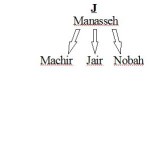
This contradiction could just as well have been titled: Two variant traditions on how to legitimate the possession of Gilead. If we compare the genealogies of Manasseh’s sons as portrayed in Num 26:29, 36:1, Josh 17:1, and 1 Chr 2:21-22 (P) with that of Num 32:39-42 (J) we notice some interesting discrepancies. Not surprisingly, these variant genealogies have their origins in two different traditions: the former list of passages come fromRead More
#323. Did Moses give the children of Gad, Reuben, and the half tribe of Manasseh their Transjordanian possessions before the conquest of Canaan OR were Eleazar and Joshua to give it to them after the conquest? (Num 32:33; Deut 3:12; Josh 1:15, 13:8 vs Num 32:28-29)
This contradiction is rooted in variant textual traditions that were brought together during the Torah’s redaction. Not surprisingly, the only tradition that claims that these Transjordanian possessions will be assigned to the children of Reuben and Gad by Eleazar and Joshua after the conquest of Canaan is also the same tradition that assigns conditions to the granting of these possessions, which were discussed in the previous entry (#322)—the Priestly source. So the conditionsRead More
#324. Did the Israelites completely destroy the cities of the kingdoms of Sihon and Og and all of Gilead OR not? (Num 32:16-17, 32:24; Deut 2:33-36, 3:3-6 vs Num 21:25, 32:26, 32:33)
#325. Did the Israelites completely annihilate all the indigenous of these lands OR not? (Num 21:32-35; Deut 2:33-36, 3:3-6 vs Num 32:17; Josh 13:13)
Not only are there variant traditions in the Torah that talk about when these Transjordanian territories were conquered and by whom (#317-318)—and even if there was a Transjordanian conquest (#282-285)—but there are also variant traditions describing what happened to the land’s cities and inhabitants. Were these cities utterly destroyed or did the Israelites simply “move in” to them? Likewise, were the inhabitants completely wiped out or were there still remnants of themRead More
#326. Did Moses write down the Israelites’ itinerary by order of Yahweh OR not? (Num 33:2 vs Ex 15:22, 17:1; Num 11:1-3, 12:15, 13:26, 21:4, 21:18; Deut 1:1-2, 2:8, 10:6-7, etc.)
And Moses wrote down their route according to their points of departure by Yahweh’s word. (Num 33:2) Although there is no verse in the Torah that explicitly contradicts the claim made here in Numbers 33:2, there is nonetheless implicit support for drawing this claim into question by pinning it against other, and variant, itinerary traditions of the Torah that were also allegedly written by word of Yahweh, and which contradict and/orRead More
#332. Do the Israelites travel from Hazeroth to Rithmah OR to Kadesh in the Wilderness of Paran? (Num 33:18 vs Num 12:15, 13:26)#333. When do the Israelites arrive in Kadesh: in the 2nd year OR the 40th? (Num 13-14; Deut 1:19-46 vs Num 33:5-39)#334. How many times did the Israelites arrive at Kadesh: once OR twice? (Num 33:5-39; Deut 1:19-46 vs Num 13-20)
There are severe chronological and geographical discrepancies at this point in the itineraries, specifically related to Kadesh, and harmonizing these various traditions is no longer possible. At this point we must try to piece together the views of these different scribal schools—in Levine’s words, to understand “the significantly different perceptions of the wilderness experience” through the eyes of these different scribes as they themselves wrote about it (Numbers 1-20, 49) ForRead More
#335. Where were the Israelites from the 2nd to 40th year of the Wilderness period: traveling southward from Kadesh toward the Gulf of Elath, then northward back to Kadesh OR traveling northward from Sinai to the Gulf of Elath OR traveling southward, encamping around Mount Seir, and then traveling through Edom? (Num 14-20 vs Num 33:17-35 vs Deut 2:1-15)
The Wilderness itineraries of the Torah diverge quite radically after the Israelites depart, or never had arrived as the case may be (#332-334), from Kadesh in the 2nd year. Here is a brief summary of these traditions. The combined Yahwist (J) & Priestly (P) Traditions of Numbers 13-20. This now combined narrative has the Israelites depart from Kadesh in the 2nd year and trek into the wilderness toward the Sea ofRead More
#336. Do the Israelites travel from Moseroth/Moserah to Bene-Jaakan OR to Gudgod? (Num 33:30-31 vs Deut 10:6-7)
#337. Do the Israelites travel from Bene-Jaakan to Hor-Haggidgad OR Moserah? (Num 33:31-32 vs Deut 10:6)
As noted in the previous entry (#335) the Priestly writer’s itinerary stops listed in Numbers 33:18-35 are unknown to the itinerary tradition(s) of Numbers 11-21. Yet four of these place-names were apparently know to another tradition which the Deuteronomist picked up and briefly used. Comparatively, here is how each tradition used these place-names: Even though three of these place-names are variously vocalized Moseroth and Moserah Bene-Jaakan and Beeroth (the Wells of)Read More
#339. Where did Aaron die: Hor OR Moserah? (Num 33:38 vs Deut 10:6)
#340. When did Aaron die: in the 40th year of the wilderness period OR much earlier? (Num 33:38 vs Deut 10:6-7)
After the Israelites arrive at Kadesh for the first and only time according to the itinerary of Numbers 33 (but see contradictions #332-334), they quickly move to mount Hor at the edge of the land of Edom, where it is stated: Aaron died there in the 40th year after the children of Israel came out of the land of Egypt, in the 5th month, on the 1st day of the month.Read More
#341. Do the Israelites conquer Transjordan OR not? (Num 21:21-35; Deut 2:24-3:11 vs Num 33:45-49)
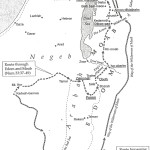
When compared to the earlier itineraries of Numbers 20-21 and Deuteronomy 1-3, the itinerary of Numbers 33 bears witness to a number of discrepancies and contradictions after the Israelites leave mount Hor at the end of the 5th month of the final and last 40th year of the wilderness period (Num 33:39). Many of these contradictions have already been discussed: While Numbers 33:40 (P) merely notes that the Canaanite king ofRead More
#342. Were the Israelites to dispossess the indigenous Canaanites OR utterly destroy them? (Num 33:51-52; Ex 23:28-33 vs Deut 7:1-16)
The itinerary of Numbers 33 ends at verse 49 with the Israelites on the plains of Moab, with no mention of a Transjordanian conquest as previously noted (#341). Here our Priestly author launches into the conquest of the promised land theme, articulated as the very words of Yahweh himself: Speak to the children of Israel and say to them: “When you cross the Jordan to the land of Canaan, you shallRead More
#343. What were the borders of the land of Canaan promised to the patriarchs by Yahweh: from the brook of Egypt to the Euphrates OR from the Red Sea to the Euphrates OR from the Wilderness to Lebo-Hamath OR from Beersheba to Dan (Gen 15:18; Deut 1:7, 11:24; Josh 1:4 vs Ex 23:31 vs Num 34:1-12; Josh 13-19; Ezek 47:13-21 vs Judg 20:1; 1 Sam 3:20; 2 Sam 3:10, 17:11, etc.)?#344. Did Yahweh promise Gilead and Transjordan as part of the promised land OR not (Deut 1-3, 34:1-3 vs Num 34:1-12; Ezek 47:13-20)?
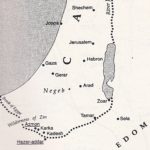
The Bible as it has come down to us preserves a number of varying traditions concerning the size and border of the promised land. Said differently, throughout the roughly six centuries that defined the monarchy, Israel’s exile, and its post-exilic restoration, biblical scribes variously delimited Israel’s borders, often in idealized and utopian ways. This fact the biblical record bears witness to. And Yahweh spoke to Moses: “This is the land thatRead More
The Festival Calendars (Ex 23:14-17 vs Ex 34:18-26 vs Deut 34:18-26 vs Lev 23 vs Num 28-29)
There are 5 different festival calendars in the Pentateuch, each one originating from a once separate and independent source: Exodus 23:14-17 (from the Elohist source) Exodus 34:18-26 (from the Yahwist) Deuteronomy 16:1-17 (from the Deuteronomist) Leviticus 23 (from the Priestly source, accredited to the Holiness Code) Numbers 28-29 (also from the pen of P) I am presently going through these different calendars and will be posting their contradictions and differences overRead More
#345. A murderer may flee to one of Yahweh’s altars for asylum OR only to one of the cities of refuge (Ex 21:12-14 vs Num 35:11-34; Deut 19:1-13; Josh 20:1-9)?

“You shall make accessible to yourselves towns which will serve you as towns of asylum where a manslayer may flee, one who kills a human being inadvertently. These towns shall serve you as places of asylum from an avenger so the manslayer will not die until he stands before the congregation for judgment.” (Num 35:11-12) There are a number of traditions in the Torah that speak of a manslayer (that isRead More
#346. Does Yahweh establish the cities of refuge for “every murderer” OR for only those who have killed another unintentionally? (Deut 19:4-12 vs Num 35:9-15; Josh 20:2-3)
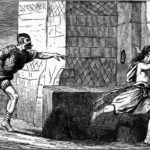
Working from the previous entry (contradiction #345), the Torah, or Hexateuch to include the book of Joshua, speaks of the tradition of asylum in a number of different places. Arranged in roughly chronological order these are: Exodus 21:12-14 from the 9th-8th century Elohist tradition (see #345) Deuteronomy 4:41-43 & 19:1-13 from the 7th century Deuteronomic tradition Numbers 35: 9-28 from the 6th century Priestly tradition Joshua 20:1-9 which looks like aRead More
#347. Does the murderer merely flee to a city of refuge OR must his case first be judged at the gate before admittance? (Deut 19:1-10 vs Num 35:9-18; Josh 20:1-6)
This entry follows the previous two entries (#345 & #346) on the Torah’s variant asylum traditions for murderers. It discusses, once again, a unique feature found only in the Deuteronomic tradition, or shall I say a unique silence or omission. No where does the Deuteronomic tradition (Deut 19:1-13) reference any legal proceedings associated with fleeing to, being admitted entrance in, and residing in a city of refuge. This version of theRead More
Introduction to Forthcoming Contradictions for Deuteronomy

We finally make it to the book of Deuteronomy—a book that in my view best exemplifies how later scribes, in this case the Deuteronomist, modified, rewrote, and even contradicted earlier tellings of Israel’s stories and traditions in an attempt to “up-date” these older traditions so that they better conformed with the religious and political views of their own historical circumstances. But don’t take my word on this matter. Rather, take theRead More
#349. Does the book of Deuteronomy contain “all the words” that Yahweh spoke to Moses across the Jordan OR not? (Deut 1:1-3 vs Ex 21-31, 34-40; all of Leviticus; Num 1-10, 15, 17:1-20:13, 28-31)
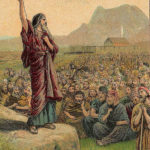
The book of Deuteronomy opens with this seemingly innocuous claim: These are the words which Moses spoke to all of Israel on the other side of the Jordan in the wilderness, in the plains before the Suph (sea), between Paran and Tophel and Laban and Hazeroth and Di-zahab (11 days from Horeb by way of mount Seir up to Kadesh-barnea). And it came to pass in the 40th year in theRead More
#350. After the conquering of Sihon and Og does Moses deliver his first speech OR does Moab hire Balaam, the Israelites commit apostasy at Baal Peor, Yahweh grants the priesthood to Phinehas, Moses and Eleazar take a second census, Yahweh gives laws for the sacrificial calendar, etc… (Deut 1:4-3:29 vs Num 22:1-36:13)
Deuteronomy’s Moses claims that he gives his first speech to the children of Israel, who are assembled before him on the plains of Moab, immediately after the conquest of the kingdoms of Sihon and Og. After he struck Sihon king of the Amorites who lived in Hesbon and Og king of Bashan who lived in Ashtaroth at Edrei on the opposite side of the Jordan in the land of Moab, MosesRead More
#351. After their stay at Horeb, did Yahweh command the Israelites to “Go! Possess the land” OR not? (Deut 1:6-8 vs Num 10:28-36)
Contradictions in the Bible is really a website devoted to textual criticism of the Bible, in particular to what scholars label as source-criticism, that is identifying the Bible’s different and often competing textual sources and assessing when they were written, by whom, to address what historical concerns, in relation to what other literary works, etc. Nearly all of the Bible’s contradictions, from minute narrative inconsistencies to larger theological and ideological agendasRead More
#352. Who initiates the proposal to appoint judges over the Israelites: Moses OR Jethro? (Deut 1:9-13 vs Ex 18:17-23)#353. When is this judiciary appointment made: before OR after Sinai? (Ex 18:13 vs Deut 1:19)#354. Where is the judiciary formed: at Rephidim OR Horeb? (Ex 19:2 vs Deut 1:19)#355. What are the criteria of selecting these judges: “men of truth, who fear god and hate gain” OR “men with wisdom, discernment, and knowledge”? (Ex 18:21 vs Deut 1:13)#356. Did “Moses do everything that Jethro had instructed him to do” OR not? (Ex 18:24-25 vs Deut 1:9-18)
In my previous post, Moses Retells His Story (Part 1) we saw how a reader might react to the realization that Moses’ renarration of the appointment of the judiciary in Deuteronomy 1:9-18 differed significantly from its “original” narration in Exodus 18:13-26. In that post, I neither attempted to explain why, nor how, these differences existed. I simply presented our 1st person reader grappling with these textual inconsistencies and contradictions which heRead More
#357. Do the people initiate the plan to send spies to scout out the land OR does Moses command the people to do this? (Deut 1:22 [D] vs Num 13:17 [J])#358. Is the plan to send spies presented as an alternative plan OR Yahweh’s original commandment? (Deut 1:21-22 [D] vs Num 13:1 [P])#359. Are the Amorites in the land OR is it the Canaanites and the Amalekites? (Deut 1:20, 1:27, 1:44 [D] vs Num 13:29, 14:25, 14:43-45 [J])#360. In the face of there being giants in the land, who encourages the people to have faith in Yahweh: Moses OR Caleb OR Caleb and Joshua? (Deut 1:29 [D] vs Num 13:30 [J] vs Num 14:6-9 [P])#361. Does Moses intercede on the people’s behalf exhorting Yahweh not to wipe them out OR does he not? (Num 14:11-23 [J] vs Deut 1:29-40 [D])#362. Is Yahweh also incensed with Moses OR is he not? (Deut 1:37, 3:26 [D] vs Num 14:11-35 [J/P])#363. After the men are defeated at Hormah, do they turn back into the wilderness OR do they return to Kadesh? (Deut 1:40, 2:1 [D]; Num 14:25 [J] vs Deut 1:46 [D]; Num 20:14 [P])
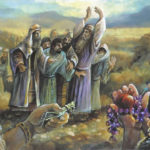
The story of the spying of the promised land is initially recounted in Numbers 13-14, which as we have already seen is a composite text of the Yahwist and later Priestly traditions (see Contradictions #233, #234, #235-236, #237, and #238-240). When we say “composite text,” we mean that the text/story in the form that it has come to us modern readers is composite in nature; it is composed of two onceRead More
#364. Does Yahweh command the Israelites to pass through Edom OR does Moses send messengers to request passage? (Deut 2:2-4 [D] vs Num 20:14-17 [J])#365. When this occurs, are the Israelites wandering about the hill country of Seir OR are they at Kadesh? (Deut 2:1-2 [D] vs Num 20:14 [J])#366. The Edomites are afraid of Israel and thus do not provoke a battle OR they seek them out to fight and it is the Israelites who are afraid? (Deut 2:4-5 [D] vs Num 20:18-21 [J]; Judg 11:16-18)#367. Do the Israelites acquire food and drink from the Edomites OR is this refused? (Deut 2:6-7, 2:28-29 [D] vs Num 20:19-20 [J])#368. Do the Israelites pass through Edom OR are they refused passage and flee? (Deut 2:7-8, 2:28-29 [D]; Num 21:10, 33:41-44 [P] vs Num 20:21 [J])#369. After the Israelites’ encounter with Edom, do they march on toward the wilderness of Moab OR around Moab OR into the Negeb against Hormah? (Deut 2:8 [D]; Num 33:43-44 [P] vs Num 21:12-20 [J] vs Num 21:1-3 [J])
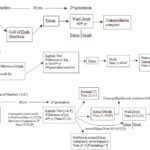
Everyone knows that when the Israelites asked for food and water from the Edomites, the Israelites’ brothers from the line of Esau, and permission to pass through their country they were denied these things and forced to pass around Edom. This story we know from Numbers 20:14-21, which scholars have identified as part of the older southern Yahwist tradition [J]. Yet when Moses renarrates this story some 40 years later, narrativelyRead More
#370. Does Deuteronomy recognize the tradition of exterminating the exodus generation OR not? (Deut 2:14-16 vs Deut 2:7, 8:2, 8:4, 9:7, 29:4)
And the days that we went from Kadesh-barnea until we crossed the wadi Zered were 38 years, until the end of the generation (the men of war) from the camp as Yahweh swore to them. (Deut 2:14) We have already thoroughly looked at the contradictory traditions preserved in the Torah concerning Kadesh Contradiction #260. Where was Kadesh: in the Wilderness of Paran OR Zin? Contradiction #261. When did the Israelites arriveRead More
#371. After passing through Edom, did Yahweh speak to Moses about the dispossession of Moab, Edom, and Ammon OR not? (Deut 2:9-23 vs Num 20-21)
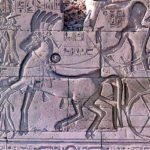
Deuteronomy 2:9-23 is another passage uniquely crafted by the Deuteronomist (see others in Contradictions #349, #350, #351, and #370) and was designed to convey themes and ideological beliefs dear to this 7th century author and his scribal guild. Said differently, and on a textual level, despite “Moses’” insistence that after they passed through Edom—or around Edom or back toward the Red Sea or forward to Hor, depending on which tradition oneRead More
#372. Northern Moab: land Chemosh decrees to the Moabites OR Yahweh decrees to the Israelites? (Num 21:29; Judg 11:24 & the Mesha stele vs Deut 2:24)
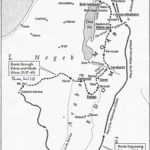
Since I’ve already dealt with the Through-Moab (D) or Around-Moab (J) contradiction in #281, I thought I’d spend some time writing about how scribes of the ancient world legitimated the conquest and ownership of land as well as explained the loss of their land. This was accomplished through the use of a commonly used literary topos or convention, and in our present case both the Bible and the 9th century BCERead More